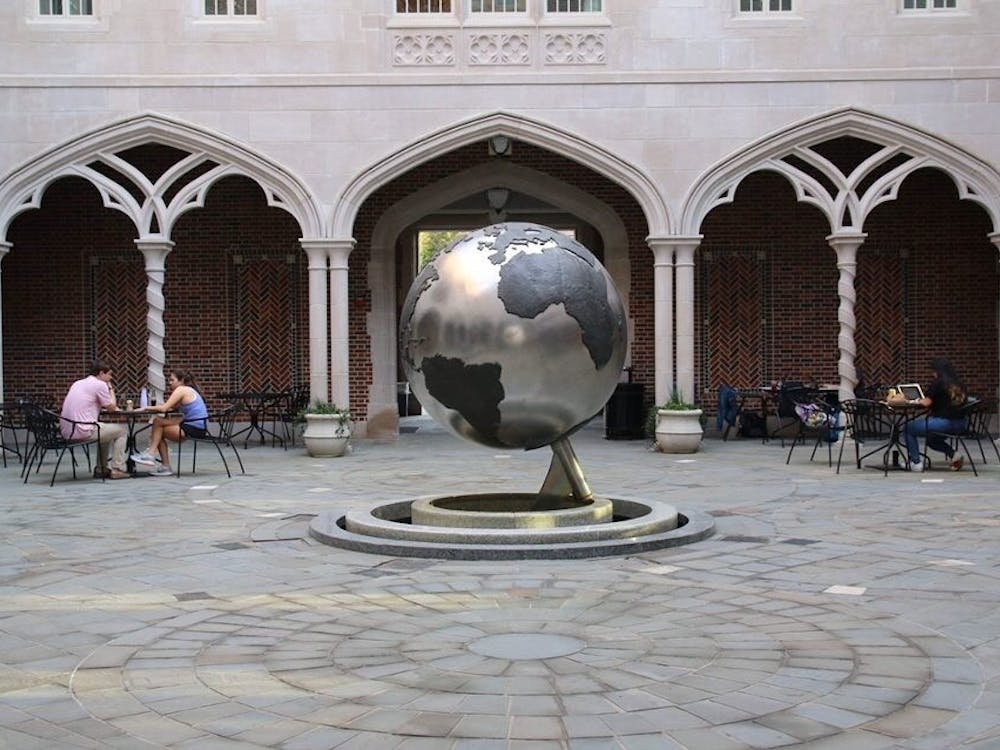As the people of this nation continue to grapple with living in a diverse society that has historically discriminated against racial and ethnic minorities, women, and LGBTQ+ people, the University of Richmond campus reflects this national climate. In this five-part series, The Collegian seeks to tell a few of the stories of non-majority students. These stories are by no means the only ones that need to be told, nor do they represent the experiences of all historically marginalized groups on campus.
Fatema Al Darii fantasizes about being a full-time world traveler with a single bag strapped to her back filled with her most meaningful possessions and nothing else.
“I like to walk a lot and get lost, and see what I can find along the way,” Al Darii said.
Al Darii, a sophomore from Al Buraimi, Oman, is interested in a nomadic and minimalist way of life, wanting to soak in every experience she can get while passing through places. But for now, she is anchored at college for four years, staying in Richmond on the weekdays and often venturing out of town for the weekends and holidays. This lifestyle has shaped the way she sees herself as a student at the University of Richmond.
Al Darii has never had the goal of becoming fully integrated into the culture at UR, she said. She said she wanted to be an observer, someone able to have a meaningful relationship to a place, make an impact and take that experience with her to the next destination in her life.
“Being part of the group has never been an issue to me -- it’s just how I’m wired,” Al Darii said. She described it as a paradox of feeling both familiar and foreign and the same time.
With this mentality, Al Darii said she had felt supported socially by her friends and academically by her professors and the staff at the Westhampton Deanery, but she had noticed barriers that divided international and American students on campus.
Al Darii first came to America her junior year of high school when she was awarded a scholarship to study at a boarding school in Princeton, New Jersey. After finishing her last two years of high school, she decided to attend the UR because she wanted something different from the Northeast.
When she arrived in Virginia, Al Darii found its southern hospitality to be similar to the welcoming and communal culture back home in Oman, she said.
One thing she discovered when first coming to Richmond was that she wasn’t always identified as an international student.
“Often people will think I’m American or even African-American and expect me to have some experiences or some things that I don’t have so I can’t really elaborate on,” Al Darii said.
Al Darii noted that there were distinct differences between her international orientation and the freshman orientation. When students were repeating each other’s names for ice-breakers at freshman orientation, she said that some students admitted that they didn’t know how to say her name, and they wouldn’t even try because they may get it wrong.
Enjoy what you're reading?
Signup for our newsletter
“It’s just the fear of not knowing,” Al Darii said. “It’s this fear of maybe not liking what you’ll find out, or that you will offend, a very Western thing I think.”
For Al Darii, it was easier to intermingle between the international students at orientation because they didn’t have a fear of the unknown and they didn’t worry about offending anyone.
During her time at UR, she has become involved in multiple organizations on campus including Green UR, the martial arts club, Muslim Student Alliance, the Westhampton Big/Little Program, APO, UR Zen and the Bollywood Jhaktas dance group.
Al Darii’s eyes lit up and a large smile spread across her face when she spoke about her love for Bollywood movies. Al Darii grew up singing along to the Bollywood songs and has always wanted to learn the dance routines, so she joined the dance group last semester.
One of Al Darii’s favorite things to do outside of her extracurricular activities is simply having as many conversations with people as she can, inquiring about stories and investigating other's perspectives on subjects.
Sophomore Charity Yeyeodu said she had met Al Darii in their first year seminar, Belief and Doubt in Literature.
“We had mutual friends and she recognized that, and immediately came over and started talking to me,” Yeyeodu said. “Once that happens, you’re done. You’re her friend.”
Siwanta Knowles Thapa, a first-year from Nepal, met Al Darii at an event early in the year. Thapa said that Al Darii was always seeking to connect with and offer help to international students.
“Fatema is a really awesome person,” Thapa said. “I think people can empathize with her.”
Al Darii has a mix of both international and American friends, but they often go their separate ways when it comes to partying and drinking on the weekend, she said. Al Darii thinks that the drinking culture creates an invisible barrier between the international and American students, she said.
Al Darii said the emphasis on drinking as a social activity was a big issue that the international students have discussed, because they do not like how alcohol is consumed on campus. Although it can be a social thing, binge drinking and drinking with the goal of getting wasted is not how Al Darii and her friends like to have fun together, she said. Al Darii said that this contributed to the divide that can occur between the students.
“I think it’s a turn-off for international students to interact with American students,” Al Darii said.
Thapa shares a similar perspective on drinking, he said. At a party he went to early on in the year, he watched some people play drinking games and did not get the same amusement out of it, he said.
“I was just standing there like, 'how are you enjoying this?'” he said.
Al Darii and Thapa said a lot of their friends organized alternative weekend events or their own small parties, and the international club hosts special nights for the students to mingle.
After two years here, Al Darii believes that she has reached the capacity of what UR can give her for positive social experiences, she said.
Yeyeodu sees this restlessness in Al Darii, she said. “She doesn’t want to be anywhere in one place for too long," Yeyeodu said. "She wants to see the world."
Al Darii said it wasn't that the university didn't have enough to offer for her as a student of diversity, but she was always searching for new things to discover within the city and on campus. She said she felt as if she might have found it all, but she was still searching.
“It’s like the flavor has become familiar,” Al Darii said. “What I seek are these different flavors and experiences.”
This is the fourth installment of a five-part series, to be published one per day this week. Read part I here, part II here and part III here.
Support independent student media
You can make a tax-deductible donation by clicking the button below, which takes you to our secure PayPal account. The page is set up to receive contributions in whatever amount you designate. We look forward to using the money we raise to further our mission of providing honest and accurate information to students, faculty, staff, alumni and others in the general public.
Donate Now



